
The Book of Jonah is one of the twelve minor prophets of the Nevi'im ("Prophets") in the Hebrew Bible, and an individual book in the Christian Old Testament. The book tells of a Hebrew prophet named Jonah, son of Amittai, who is sent by God to prophesy the destruction of Nineveh, but attempts to escape his divine mission.

Jonah the son of Amittai or Jonas is a Jewish prophet in the Hebrew Bible hailing from Gath-hepher in the Northern Kingdom of Israel around the 8th century BCE. He is the central figure of the Book of Jonah, one of the minor prophets, which details his reluctance in delivering the judgment of God to the city of Nineveh in the Neo-Assyrian Empire. After he is swallowed by a large sea creature and then released, he returns to the divine mission.
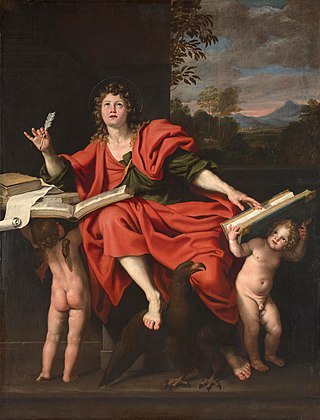
The Second Epistle of John is a book of the New Testament attributed to John the Evangelist, traditionally thought to be the author of the other two epistles of John, and the Gospel of John. Most modern scholars believe this is not John the Apostle, but in general there is no consensus as to the identity of this person or group.

The Vulgate is a late-4th-century Latin translation of the Bible. It is largely the work of Jerome who, in 382, had been commissioned by Pope Damasus I to revise the Vetus Latina Gospels used by the Roman Church. Later, of his own initiative, Jerome extended this work of revision and translation to include most of the books of the Bible.

Sefer haYashar is a medieval Hebrew midrash, also known as the Toledot Adam and Divrei haYamim heArukh. The Hebrew title "Sefer haYashar" might be translated as the "Book of Righteousness". but it is known in English translation mostly as The Book of Jasher following English tradition. Its author is unknown.

The Nag Hammadi library is a collection of early Christian and Gnostic texts discovered near the Upper Egyptian town of Nag Hammadi in 1945.

The Imitation of Christ, by Thomas à Kempis, is a Christian devotional book first composed in Medieval Latin as De Imitatione Christi. The devotional text is divided into four books of detailed spiritual instructions: (i) "Helpful Counsels of the Spiritual Life", (ii) "Directives for the Interior Life", (iii) "On Interior Consolation", and (iv) "On the Blessed Sacrament". The devotional approach of The Imitation of Christ emphasises the interior life and withdrawal from the mundanities of the world, as opposed to the active imitation of Christ practised by other friars. The devotions of the books emphasize devotion to the Eucharist as the key element of spiritual life.

The Kingdom of God Is Within You is a non-fiction book written by Leo Tolstoy. A Christian anarchist philosophical treatise, the book was first published in Germany in 1894 after being banned in his home country of Russia. It is the culmination of 30 years of Tolstoy's thinking and lays out a new organization for society based on an interpretation of Christianity focusing on universal love.
William Cureton was an English Orientalist.
"Joy to the World" is an English Christmas carol. It was written in 1719 by the English minister and hymnist Isaac Watts. The carol is usually sung to the American composer Lowell Mason's 1848 arrangement of a tune attributed to George Frideric Handel. The carol's lyrics are a Christian reinterpretation of Psalm 98 and Genesis 3.
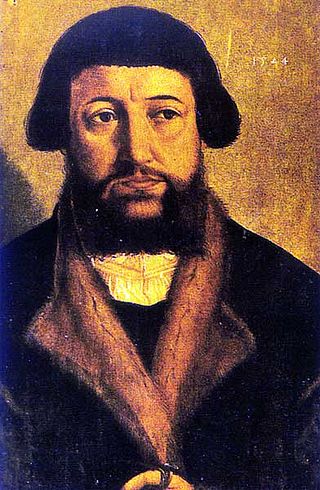
Andreas Osiander was a German Lutheran theologian and Protestant reformer.

Wycliffe's Bible or Wycliffite Bibles or Wycliffian Bibles (WYC) are names given for a sequence of Middle English Bible translations believed to have been made under the direction or instigation of English theologian John Wycliffe of the University of Oxford. They are the earliest known literal translations of the entire Bible into English. They appeared over a period from approximately 1382 to 1395.
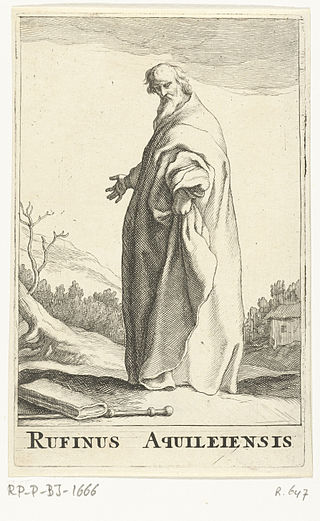
Tyrannius Rufinus, also called Rufinus of Aquileia, was an early Christian monk, philosopher, historian, and theologian who worked to translate Greek patristic material, especially the work of Origen, into Latin.
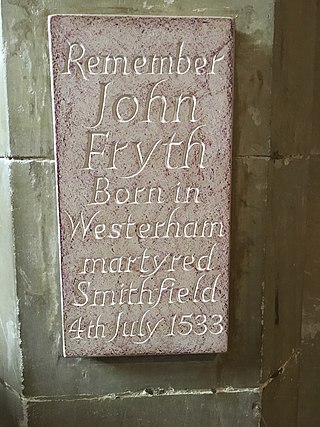
John Frith was an English Protestant priest, writer, and martyr.
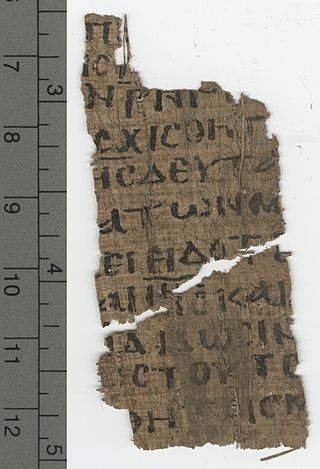
John 21 is the twenty-first and final chapter of the Gospel of John in the New Testament of the Christian Bible. It contains an account of a post-crucifixion appearance in Galilee, which the text describes as the third time Jesus had appeared to his disciples. In the course of this chapter, there is a miraculous catch of 153 fish, the confirmation of Peter's love for Jesus, a foretelling of Peter's death in old age, and a comment about the beloved disciple's future.
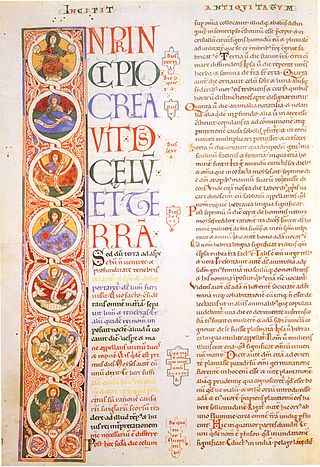
Antiquities of the Jews is a 20-volume historiographical work, written in Greek, by historian Josephus in the 13th year of the reign of Roman emperor Domitian, which was 94 CE. The book contains an account of the history of the Jewish people for Josephus's gentile patrons. In the first ten volumes, Josephus follows the events of the Hebrew Bible beginning with the creation of Adam and Eve.
The Praier and Complaynte of the Ploweman unto Christe: written not longe after the yere of our Lorde. M. and three hundred is a short, anonymous English Christian text, probably written in the late fourteenth or early fifteenth century and first printed in about 1531. It consists of a prose tract, in the form of a polemical prayer, expressing Lollard sentiments and arguing for religious reform. In it, the simple ploughman/narrator speaks on behalf of "the repressed common man imbued with the simple truths of the Bible and a knowledge of the commandments against the mighty and monolithic conservative church". The pastoral-ecclesiastical metaphor of shepherds and sheep is used extensively as a number of criticisms are made about such things as confession, indulgences, purgatory, tithing and celibacy. The Prayer became important in the sixteenth century, when its themes were taken up by proponents of the Protestant Reformation.

The First Epistle of Clement is a letter addressed to the Christians in the city of Corinth. The work is attributed to Clement I, the fourth bishop of Rome and almost certainly written by him. Based on internal evidence some scholars say the letter was composed some time before AD 70, but the common time given for the epistle's composition is at the end of the reign of Domitian. As the name suggests, a Second Epistle of Clement is known, but this is a later work by a different author.
Joseph Mede was an English scholar with a wide range of interests. He was educated at Christ's College, Cambridge, where he became a Fellow in 1613. He is now remembered as a biblical scholar. He was also a naturalist and Egyptologist. He was a Hebraist, and became Lecturer of Greek.
Richard Tracy was an English lay Protestant reformer and Member of Parliament.















